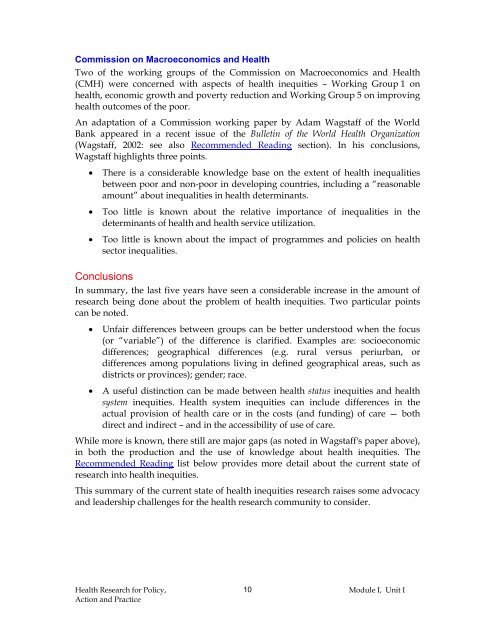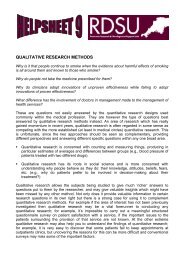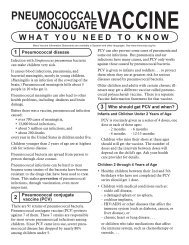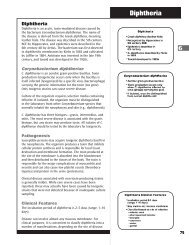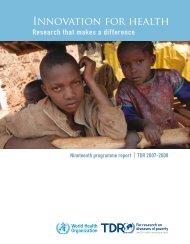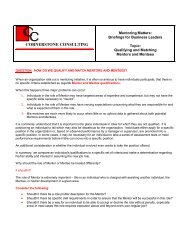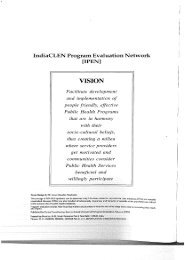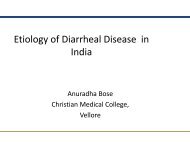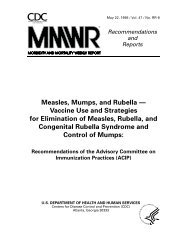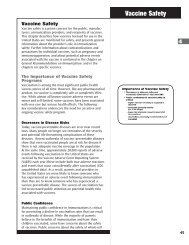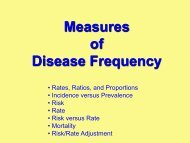Commission on Macroeconomics <strong>and</strong> <strong>Health</strong>Two of the working groups of the Commission on Macroeconomics <strong>and</strong> <strong>Health</strong>(CMH) were concerned with aspects of health inequities – Working Group 1 onhealth, economic growth <strong>and</strong> poverty reduction <strong>and</strong> Working Group 5 on improvinghealth outcomes of the poor.An adaptation of a Commission working paper by Adam Wagstaff of the WorldBank appeared in a recent issue of the Bulletin of the World <strong>Health</strong> Organization(Wagstaff, 2002: see also Recommended Reading section). In his conclusions,Wagstaff highlights three points.• <strong>The</strong>re is a considerable knowledge base on the extent of health inequalitiesbetween poor <strong>and</strong> non-poor in developing countries, including a “reasonableamount” about inequalities in health determinants.• Too little is known about the relative importance of inequalities in thedeterminants of health <strong>and</strong> health service utilization.• Too little is known about the impact of programmes <strong>and</strong> policies on healthsector inequalities.ConclusionsIn summary, the last five years have seen a considerable increase in the amount ofresearch being done about the problem of health inequities. Two particular pointscan be noted.• Unfair differences between groups can be better understood when the focus(or “variable”) of the difference is clarified. Examples are: socioeconomicdifferences; geographical differences (e.g. rural versus periurban, ordifferences among populations living in defined geographical areas, such asdistricts or provinces); gender; race.• A useful distinction can be made between health status inequities <strong>and</strong> healthsystem inequities. <strong>Health</strong> system inequities can include differences in theactual provision of health care or in the costs (<strong>and</strong> funding) of care — bothdirect <strong>and</strong> indirect – <strong>and</strong> in the accessibility of use of care.While more is known, there still are major gaps (as noted in Wagstaff's paper above),in both the production <strong>and</strong> the use of knowledge about health inequities. <strong>The</strong>Recommended Reading list below provides more detail about the current state ofresearch into health inequities.This summary of the current state of health inequities research raises some advocacy<strong>and</strong> leadership challenges <strong>for</strong> the health research community to consider.<strong>Health</strong> <strong>Research</strong> <strong>for</strong> <strong>Policy</strong>,<strong>Action</strong> <strong>and</strong> <strong>Practice</strong>10Module I, Unit I
Tools <strong>and</strong> resourcesListed below are some examples of available tools related to the issue of healthinequities.1. Compendium of multicountry studies on equity, poverty <strong>and</strong> healthThis document was prepared in 1999 by Dana Carr, Davidson Gwatkin <strong>and</strong> DiannaFragueiro of the World Bank's Population, <strong>Health</strong> <strong>and</strong> Nutrition (PHN) department.<strong>The</strong> compendium introduces 14 multicountry programmes, <strong>and</strong> provides summary<strong>and</strong> contact in<strong>for</strong>mation <strong>for</strong> each of them. In a second section, tables display countryby-countrylists of studies produced <strong>and</strong> in progress under the auspices of eachprogramme. For further in<strong>for</strong>mation, contact Dana Carr at dcarr@worldbank.org.2. Country profiles on “socio-economic differences in health, nutrition <strong>and</strong>population”<strong>The</strong> HNP/Poverty <strong>The</strong>matic Group of the World Bank has produced a series of shortpublications on the health, nutrition <strong>and</strong> population status <strong>and</strong> access to relatedservices of most low-income countries, by quintile. <strong>The</strong>se data are displayed by totalpopulation, gender <strong>and</strong> place of residence (rural/urban). <strong>The</strong> in<strong>for</strong>mation is availablethrough the World Bank's web site: http://www.worldbank.org/hnp (accessed August2004).3. Equity gaugeThis is a tool <strong>for</strong> tracking gaps in health status at national or subnational levels, firstdeveloped <strong>and</strong> tested in South Africa. Several different versions of this tool are nowbeing used in an increasing number of countries. Along with technical quality,important features of the use of equity gauges include involvement of key healthsystem stakeholders, community ownership <strong>and</strong> adaptation to ensure that decisionmakingis facilitated. Experience using equity gauges was shared at a meeting inSouth Africa in August 2000. <strong>The</strong> papers <strong>and</strong> proceedings of the meeting can be foundat the following web site: http://www.hst.org.za.4. Benchmarks of fairness <strong>for</strong> health care re<strong>for</strong>mLed by Normal Daniels, a professor of philosophy at Tufts University, United Statesof America, this “policy tool” has been applied to aspects of the health care re<strong>for</strong>mprocess in several developing countries. <strong>The</strong>re are nine benchmarks. For example,Benchmarks 2-4 address different aspects of access to medical services. Benchmark 5concerns equity in financing. For more in<strong>for</strong>mation, the following publications arerecommended:Caplan RL, Light DW, Daniels N (1999). Benchmarks of fairness: a moral framework<strong>for</strong> assessing equity. International Journal of <strong>Health</strong> Services, 29:853-869.Daniels N, Light DW, Caplan R (1996). Benchmarks of fairness <strong>for</strong> health carere<strong>for</strong>m. New York, Ox<strong>for</strong>d University Press.5. World Bank Poverty Reduction Group. User’s guide to poverty <strong>and</strong> socialimpact analysis of policy re<strong>for</strong>m (draft <strong>for</strong> comments). Available athttp://www.worldbank.org/poverty.<strong>Health</strong> <strong>Research</strong> <strong>for</strong> <strong>Policy</strong>,<strong>Action</strong> <strong>and</strong> <strong>Practice</strong>11Module I, Unit I


